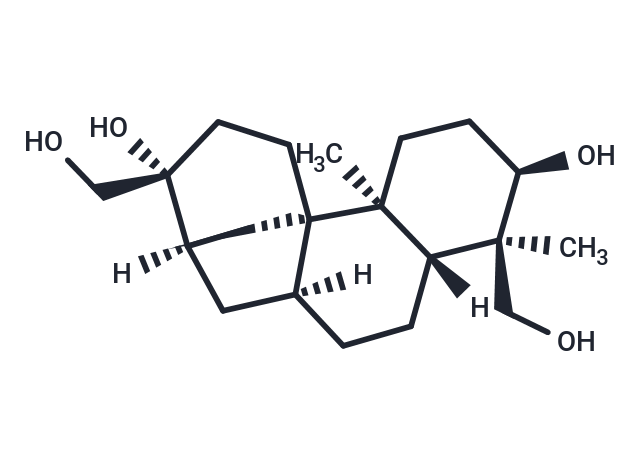
Aphidicolin
CAS No. 38966-21-1
Aphidicolin( —— )
Catalog No. M33268 CAS No. 38966-21-1
Aphidicolin, an antibiotic derived from the mold Cephalosporium aphidicola, is a potent inhibitor of DNA (deoxyribonucleic acid) synthesis, effectively hindering the proliferation of herpes simplex virus.
Purity : >98% (HPLC)
 COA
COA
 Datasheet
Datasheet
 HNMR
HNMR
 HPLC
HPLC
 MSDS
MSDS
 Handing Instructions
Handing Instructions
| Size | Price / USD | Stock | Quantity |
| 2MG | 187 | In Stock |


|
| 500MG | Get Quote | In Stock |


|
| 1G | Get Quote | In Stock |


|
Biological Information
-
Product NameAphidicolin
-
NoteResearch use only, not for human use.
-
Brief DescriptionAphidicolin, an antibiotic derived from the mold Cephalosporium aphidicola, is a potent inhibitor of DNA (deoxyribonucleic acid) synthesis, effectively hindering the proliferation of herpes simplex virus.
-
DescriptionAphidicolin is an inhibitor of DNA polymerase α and δ, prevents mitotic cell division by interfering DNA polymerase activity. Aphidicolin is an antibiotic produced by mold Cephalosporium aphidicola, inhibits cellular deoxyribonucleic acid synthesis and the growth of herpes simplex virus. Aphidicolin exhibits anti-orthopoxvirus activity and potentiates apoptosis induced by arabinosyl nucleosides in a human promyelocytic leukemia cell line.
-
In VitroAphidicolin (0.5 μM, 5 μM; 0-5 d) selectively kills neuroblastoma cells, but shows moderate cytotoxicity on normal human embryonal cells and HeLa, H9, A549 and Caco-2 cell lines.Aphidicolin (0.4 μg/mL; 3 d) arrests cell cycle at G2 phase.Aphidicolin (100 nM-10 μM; 48 h) inhibits cell proliferation via the p53-GADD45β pathway and (1 μM; 24 h) induces apoptosis in AtT-20 cells.Aphidicolin (10 μM; 0-6 h) decreases the phosphorylation of Akt, (100 nM-10 μM; 24 h) increases the mRNA levels of the stress response gene growth arrest and DNA damage-inducible 45β (GADD45β), a putative downstream target of p53.Aphidicolin (10 μM; 0-6 h) inhibits Varicella-zoster virus (VZV) with EC50s of 0.5-0.6 μM, with low cytotoxicity.Cell Cytotoxicity Assay Cell Line:NB cell lines: UKF-NB-1/2/3 and IMR-32 Concentration:0.5 μM, 5μM Incubation Time:1, 2, 3, 4, 5 days Result:Resulted in cellular enlargement and extension of cellular processes before cell lysis occurred.Cell Cycle AnalysisCell Line:Normal human diploid cells Concentration:0.4 μg/mL Incubation Time:3 days or 7 days Result:Resulted more than 80% of the cells moved through S phase and were accumulated at G2 phase. Inbihited the growth of the cells completely without causing apparent cell death.Western Blot Analysis Cell Line:AtT-20 cells pituitary corticotroph tumor cells Concentration:10 μM Incubation Time:0 min, 5 min, 30 min, 2 h, 6 h, 24 h Result:Inhibited Akt phosphorylation in AtT-20 cells during 5 min-2 h, in a time-dependent manner.Increased protein level of p27 during 30 min-6 h, and remarkably increased p53 level at 24 h.
-
In VivoAphidicolin, has been developed with higher solubility agent, namely Aphidicolin glycinate (AG; NSC 303812).Aphidicolin glycinate (100 mg/kg; i.p.; once every 3 h; 9 d) shows anti-tumor activity against the implanted B16 melanoma and M5076 sarcoma in murine, producing maximum increased life spans of 75%.Animal Model:M5076 sarcoma s.c. model or B16 melanoma i.p. model in murine Dosage:60 mg/kg, 100 mg/kg, 300 mg/kg Administration:Intraperitoneal injection; once every 3 h; 9 daysResult:Inhibited tumor growth significantly.
-
Synonyms——
-
PathwayOthers
-
TargetOther Targets
-
RecptorOthers
-
Research Area——
-
Indication——
Chemical Information
-
CAS Number38966-21-1
-
Formula Weight338.48
-
Molecular FormulaC20H34O4
-
Purity>98% (HPLC)
-
SolubilityIn Vitro:?DMSO : 50 mg/mL (147.72 mM)
-
SMILES[H][C@]12C[C@]3([H])C[C@]1(CC[C@]3(O)CO)[C@@]1(C)CC[C@@H](O)[C@@](C)(CO)[C@]1([H])CC2
-
Chemical Name——
Shipping & Storage Information
-
Storage(-20℃)
-
ShippingWith Ice Pack
-
Stability≥ 2 years
Reference



-
Nurr1 agonist 7
Nurr1 agonist 7 (compound 110) is an agonist targeting the Nurr1 receptor, exhibiting an EC50 of 0.12 μM .
-
D-Proline
D-proline is an isomer of the naturally occurring amino acid L-Proline. D-amino acids have been found in relatively high abundance in human plasma and saliva. These amino acids may be of bacterial origin but there is also evidence that they are endogenously produced through amino acid racemase activity.
-
Superoxide dismutase...
Superoxide dismutase, Porcine erythrocytes (SOD) is the only antioxidant enzyme that scavenges the superoxide anion by converting this free radical to oxygen and hydrogen peroxide, thus preventing peroxynitrite production and further damage. Superoxide dismutase, Porcine erythrocytes is extensively researched and used in anti-inflammatory, antitumor, radiation protection, and antisenility applications.



 Cart
Cart
 sales@molnova.com
sales@molnova.com


